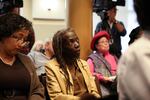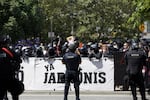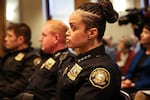Portland Mayor Ted Wheeler and Police Chief Danielle Outlaw made their case to the City Council on Thursday that the police commissioner needs the authority to regulate unpermitted protests in Portland to keep the city safe.
They pushed the Council to adopt an ordinance that gives the police commissioner, a role held by Wheeler, the ability to issue a written order regulating the time and location of protests that involve two or more groups with a history of violent clashes.
Protesters that violate the proposed order could be arrested, charged with a misdemeanor, and fined.
The mayor and the police chief came to the hearing armed with stories and facts. Outlaw noted that since 2016, the city has spent $2,945,327 on police overtime for officers keeping order at protests that might turn violent, and $441,685 in protest-related overtime in 2018.
“We’ve become a magnet for folks who are either coming from outside the community or elsewhere, with either a history of — or an expressed intent — to come to our community to commit acts of violence," Wheeler said. "It’s bad for the reputation of the city and the brand of the city ... . More importantly it makes people feel less safe in the community.”
But two powerful women in City Hall had a different take.

Commissioner-elect Jo Ann Hardesty at a City Council hearing on Mayor Ted Wheeler's proposed ordinance giving him the power to dictate the location and duration of some protests in town, Thursday, Nov. 8, 2018, Portland, Oregon.
Amelia Templeton / OPB
Commissioner Chloe Eudaly and Commissioner-elect Jo Ann Hardesty used the hearing to challenge Wheeler and Outlaw’s narrative that confrontations between groups like the Vancouver, Washington-based Patriot Prayer and counter-protesters, including antifa, have turned violent because police lack the authority they need to control the situation and intervene.
Instead, Hardesty and Eudaly raised questions about the tactics police have used on protesters, and the perception among some in the community that the bureau has taken a more permissive approach when dealing with right-wing groups.
In her first public appearance since Election Night, Hardesty, a longtime civil rights activist in the city, was invited by the mayor to testify on a panel alongside other critics of the ordinance, including the Oregon chapter of the ACLU.
“I want you to know, I trust Chief Outlaw, but she is absolutely mistaken to think that we should give the police chief power to decide who protests, when, where and how,” Hardesty said.
Hardesty urged her colleagues on the Council to delay their vote on the ordinance until she takes office in January — a request the mayor is unlikely to entertain, given that Commissioner Dan Saltzman, who is retiring, is Wheeler’s only certain vote in favor of the measure.
Hardesty called herself a child of the Civil Rights Era and noted that people who looked like her would never have won the right to vote without protests and a willingness to break unjust laws.
Related: Portland Police Face Questions Of Impartiality After Radio Show Comments
She will be the only military veteran serving on the City Council. Hardesty said that for the first time in her life, the rise of white nationalism has made her feel apprehensive when she sees a truck with an American flag on it.
Sitting just a few feet from the police chief, Hardesty accused the bureau of “escorting” far-right groups that protest in the city, and using excessive force against counter-protesters.
“I have been extremely disappointed in watching how the Portland Police Bureau has responded to out of town hate groups who show up and take over our downtown streets,” Hardesty said.
Eudaly, who has confirmed that she will not support the ordinance, used the hearing to grill Outlaw and other city officials on the police bureau’s response to right-wing extremism. She also asked about policing tactics, including the use of force, during protests.
Eudaly came prepared with a list of 46 questions, compiled by her staff with input from constituents and advocacy groups.
She noted that the most serious injuries during protests in the last year appear to have been to counter-protesters injured by police officers Aug. 4.
“These injuries appear to include third-degree chemical burns, open wounds, and at least one traumatic brain injury,” Eudaly said.
“One of the goals of the ordinance is to try to manage these events in advance so the police do not have to manage them the day of,” Deputy City Attorney Robert Taylor answered. “Aug. 4 is a good example of things that did not go well for anybody."
Eudaly drilled down in particular on the perception that police, she said, favor right-wing extremist groups like the Proud Boys and Patriot Prayer over left-wing counter-protesters.
She asked if counter-demonstrators were always the group the police ordered to disperse.
Deputy Chief Robert Day said he wasn’t sure.
“I can’t speak to every event that’s occurred. We can go back and look and provide you more information,” Day said.

Portland Police in riot gear stand between right-wing protesters and counter-protesters.
Ericka Cruz Guevarra / OPB
Eudaly noted that counter-protesters were frequently injured by police use of force during protests, and asked if any members of the Proud Boys or Patriot Prayer had ever been injured by police in Portland.
“How do you explain this unequal application of force?” Eudaly asked.
“I can’t speak to who has or has not been injured,” Day said, and again offered to try to get her more information later.
Concluding, Eudaly made her own position clear.
“I know that our policies have to be content neutral, but I don’t have to be content neutral,” she said. “I’m just going to say right-wing extremists pose a greater threat to our security and to our city than ISIS, let alone left-wing counter-protesters.”
Eudaly then asked Outlaw a pointed question.
“Can the Portland Police Bureau explicitly and unequivocally state that Patriot Prayer, Proud Boys, and similar right-wing extremist organizations are the real threat to our public safety?” Eudaly said.
Outlaw said it was not her place to answer.
“You’re in a position as an elected official to do that. Given that I am not, and the Portland Police Bureau — we are not a political body — we are not in a position to do that. We focus on behaviors,” Outlaw said.
With Eudaly a clear "no" vote and commissioner Amanda Fritz also indicating opposition, it’s not clear whether Wheeler has enough votes to pass the ordinance when it moves to a second reading next week.
Commissioner Nick Fish is the swing vote the mayor needs. On Thursday, it was clear the mayor has reworked the measure in an effort to address criticism that it is unconstitutional and vulnerable to a legal challenge.

Portland Police Chief Danielle Outlaw at a City Council hearing on Mayor Ted Wheeler's proposed ordinance giving him the power to dictate the location and duration of some protests in town, Thursday, Nov. 8, 2018, Portland, Oregon.
Amelia Templeton / OPB
In an exchange with the deputy city attorney, Fish noted the latest version of the ordinance, introduced as a substitute measure on Thursday, allows the mayor to invoke his powers to designate the time and place of protests in a more limited set of circumstances.
“There must be a history of violence between groups, and the safety of participants and bystanders is at risk. And third, there is a substantial likelihood of violence based on statements or conduct of those groups,” said Taylor.
Fish said that was a significant change from the way the ordinance was originally written, which allowed the police commissioner to issue regulations for a protest that met any one of those three conditions.
“That’s an important change,” Taylor confirmed. “There was a concern about wanting to clearly limit the authority of the police commissioner.”
Fish also introduced three amendments to the ordinance, all of which passed unanimously.
Fish’s amendments require the police commissioner to issue a public written report after he issues any order pursuant to the ordinance, sets the ordinance to expire June 30, 2019 unless the Council renews it with a vote, and directs the city attorney to report back to the Council in January 2019 on other legal strategies that could be used to address violent demonstrations.
